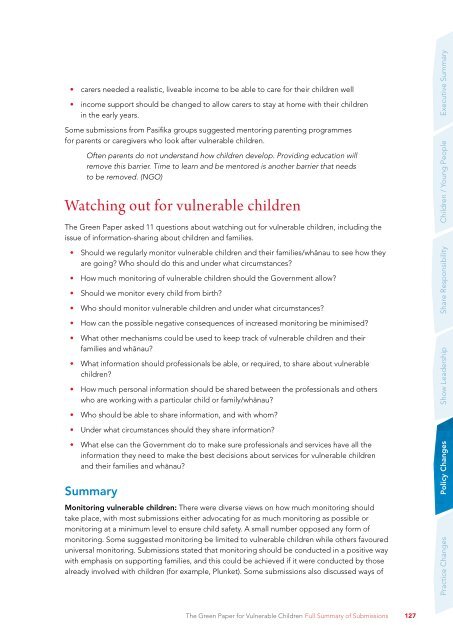The Green Paper for Vulnerable Children - Ministry of Social ...
The Green Paper for Vulnerable Children - Ministry of Social ...
The Green Paper for Vulnerable Children - Ministry of Social ...
Create successful ePaper yourself
Turn your PDF publications into a flip-book with our unique Google optimized e-Paper software.
• carers needed a realistic, liveable income to be able to care <strong>for</strong> their children well• income support should be changed to allow carers to stay at home with their childrenin the early years.Some submissions from Pasifika groups suggested mentoring parenting programmes<strong>for</strong> parents or caregivers who look after vulnerable children.Often parents do not understand how children develop. Providing education willremove this barrier. Time to learn and be mentored is another barrier that needsto be removed. (NGO)Watching out <strong>for</strong> vulnerable children<strong>The</strong> <strong>Green</strong> <strong>Paper</strong> asked 11 questions about watching out <strong>for</strong> vulnerable children, including theissue <strong>of</strong> in<strong>for</strong>mation-sharing about children and families.• Should we regularly monitor vulnerable children and their families/whānau to see how theyare going? Who should do this and under what circumstances?• How much monitoring <strong>of</strong> vulnerable children should the Government allow?• Should we monitor every child from birth?• Who should monitor vulnerable children and under what circumstances?• How can the possible negative consequences <strong>of</strong> increased monitoring be minimised?• What other mechanisms could be used to keep track <strong>of</strong> vulnerable children and theirfamilies and whānau?• What in<strong>for</strong>mation should pr<strong>of</strong>essionals be able, or required, to share about vulnerablechildren?• How much personal in<strong>for</strong>mation should be shared between the pr<strong>of</strong>essionals and otherswho are working with a particular child or family/whānau?• Who should be able to share in<strong>for</strong>mation, and with whom?• Under what circumstances should they share in<strong>for</strong>mation?• What else can the Government do to make sure pr<strong>of</strong>essionals and services have all thein<strong>for</strong>mation they need to make the best decisions about services <strong>for</strong> vulnerable childrenand their families and whānau?SummaryMonitoring vulnerable children: <strong>The</strong>re were diverse views on how much monitoring shouldtake place, with most submissions either advocating <strong>for</strong> as much monitoring as possible ormonitoring at a minimum level to ensure child safety. A small number opposed any <strong>for</strong>m <strong>of</strong>monitoring. Some suggested monitoring be limited to vulnerable children while others favoureduniversal monitoring. Submissions stated that monitoring should be conducted in a positive waywith emphasis on supporting families, and this could be achieved if it were conducted by thosealready involved with children (<strong>for</strong> example, Plunket). Some submissions also discussed ways <strong>of</strong>Practice Changes Policy Changes Show Leadership Share Responsibility <strong>Children</strong> / Young People Executive Summary<strong>The</strong> <strong>Green</strong> <strong>Paper</strong> <strong>for</strong> <strong>Vulnerable</strong> <strong>Children</strong> Full Summary <strong>of</strong> Submissions127
















